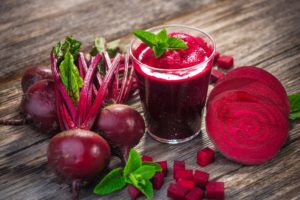
Of course, just including beetroot juice won’t replace the other lifestyle factors that influence vein health and blood pressure. It is, however, another tool that might offer some help to prevent vein aging and contribute to lower blood pressure.
Beetroot juice is naturally high in nitrates, which are converted into nitric oxide in the body. Nitric oxide helps relax and dilate blood vessels, allowing for more blood to flow through and contributing to lower blood pressure. Several studies are showing that a cup or less of beetroot juice can influence blood pressure for up to 24-hours.
One study showed that drinking just 70 ml of nitrate-rich beetroot juice was able to lower blood pressure by more than five mm Hg in 30-minutes compared to a placebo. Another study showed that drinking one cup of beetroot juice (250 ml) per day for four weeks was enough to reduce blood pressure in people with hypertension. It’s important to note, however, that people who are on medications for blood pressure might not notice the same benefits. Talk to your doctor if you’re taking blood pressure medication and have an interest in trying beetroot juice.
Not only do beetroots have high levels of nitrates that contribute to vein and heart health, but they are also a rich source of vitamins, minerals, and antioxidants that might help limit inflammation. Overall, beetroot might provide several health benefits to compliment your lifestyle. It’s safe to take and readily available, so give it a try if you like. Be warned, though: if you’re drinking it every day, you may experience some discoloration in your urine!